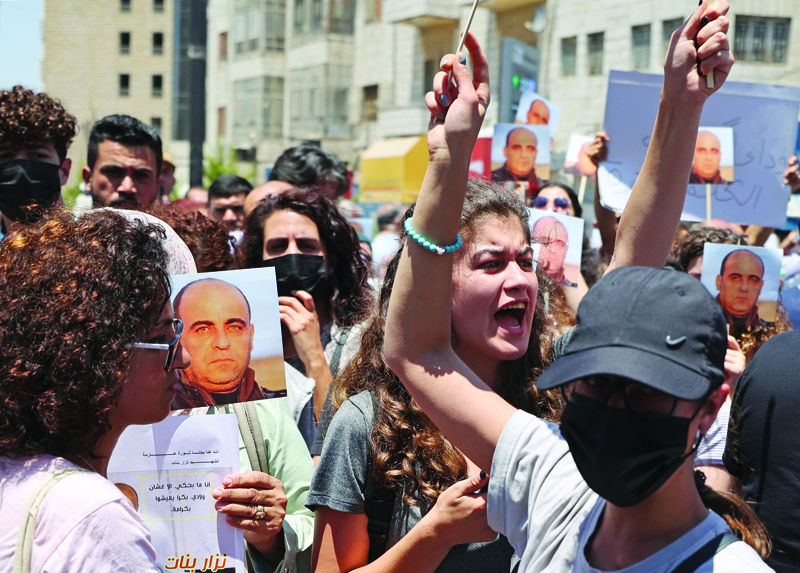 RAMALLAH: Protesters take part in a demonstration calling for Palestinian president Mahmud Abbas to quit in Ramallah in the occupied West Bank yesterday following the death of Palestinian human rights activist Nizar Banat who died shortly after being arrested. - AFP
RAMALLAH: Protesters take part in a demonstration calling for Palestinian president Mahmud Abbas to quit in Ramallah in the occupied West Bank yesterday following the death of Palestinian human rights activist Nizar Banat who died shortly after being arrested. - AFPRAMALLAH: A human rights activist and critic of the Palestinian Authority died yesterday shortly after security forces stormed his house, arrested and beat him, triggering angry protests in the occupied West Bank. The family of Nizar Banat said he had been beaten to death, in an incident that sparked outrage from fellow activists, protests in the West Bank city of Ramallah and calls for an inquiry. Banat, 43, from the flashpoint city of Hebron, was arrested early yesterday by Palestinian Authority (PA) security forces, Hebron governor Jibrin Al-Bakri said.
"Following... a summons from the public prosecution to arrest citizen Nizar Khalil Muhammad Banat, a force from the security services arrested him at dawn," Bakri said in a statement carried by the official WAFA news agency. He did not cite a reason for Banat's arrest. Banat's cousin, Hussein Banat, told AFP some 25 armed men had broken into the activist's house while he was sleeping and used pepper spray to subdue him.
"A large force entered and aggressively took off all of his clothes then beat him for eight minutes straight," he said. Speaking to the Al-Quds news website, other members of Banat's family accused security forces of "hitting him on the head with wooden sticks and bits of iron" and "deliberately murdering" him.
'Beating'
The governor said that during Banat's arrest, "his health deteriorated". "He was immediately transferred to the Hebron government hospital... After he was examined by doctors, he was pronounced dead." Banat was known for his videos posted on Facebook, in which he denounced alleged corruption in the PA.
He had registered as a candidate in Palestinian parliamentary elections, which had been set for May until president Mahmud Abbas postponed them indefinitely. Two months ago, Banat had said his house had been shot at by unknown attackers. Bakri and prime minister Mohammad Shtayyeh said an investigation had been launched into his death.
Approached by AFP, Palestinian security forces declined to comment.
Yesterday, some 300 people gathered in Ramallah, the seat of the PA, calling for Abbas to quit. "The arrests don't scare us," they chanted, brandishing portraits of Banat. "Abbas, go!" Security forces fired tear gas, and one protester was hit in the face with a canister and hospitalized. Palestinian Islamist movement Hamas, which controls the Gaza Strip, said it held president Abbas "fully responsible for the repercussions" of Banat's death.
'Dark day'
The EU, one of the biggest donors to the PA, said it was "shocked and saddened" by the incident and called for a "full, independent and transparent investigation". The bloc's delegation had voiced concern last November after Banat spent four days in custody, and again in May after Palestinian security forces raided his home.
The bloc's envoy to the Palestinians said at the time that "violence against politicians and human rights defenders is unacceptable" and urged the PA to ensure "respect for freedom of expression and the protection of human rights activists". Farid Al-Atrash, from the Palestinian rights group the Independent Commission for Human Rights, said Banat's death marked "a dark day in the history of the Palestinian people". Shawan Jabarin, director of rights group Al-Haq, joined calls for a "careful investigation".
On Tuesday, another Hebron-based Palestinian human rights activist, Issa Amro, said he was briefly detained after posting criticism of political detentions on Facebook. An opinion poll published earlier this month by the Palestinian Center for Policy and Survey Research found that 84 percent of Palestinians believe the PA is corrupt.
The PA, created under the Oslo Accords, exercises limited powers over some 40 percent of the West Bank, occupied by Zionist forces since the Six-Day War of 1967. Zionist regime, which controls all access to the territory and coordinates with the PA, directly administers the remaining 60 percent. - AFP










